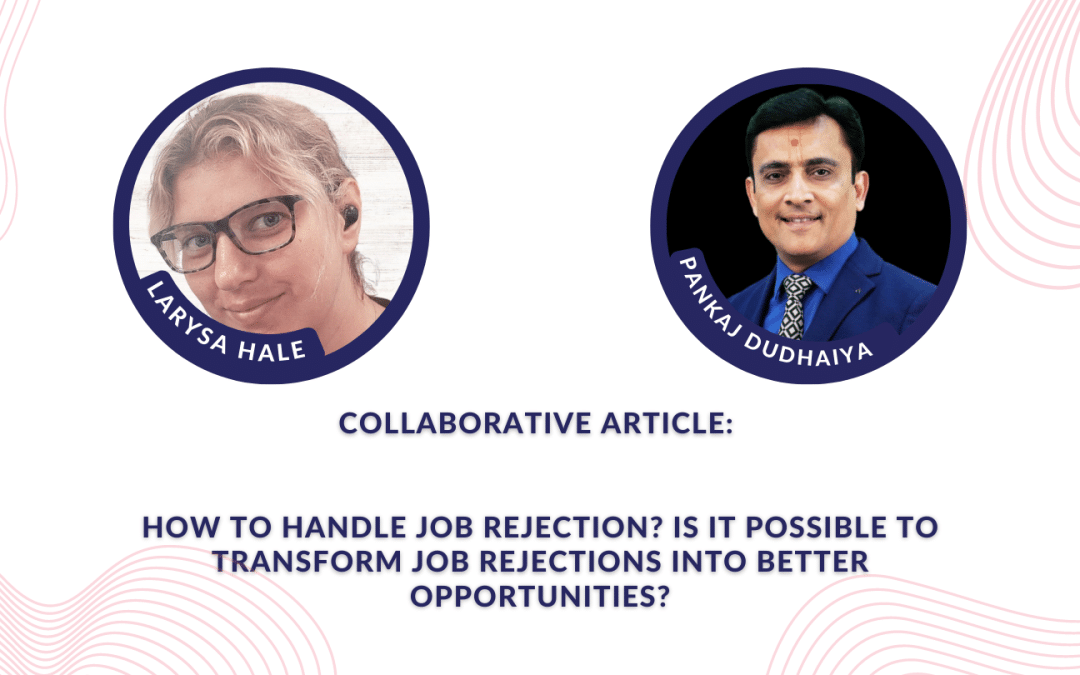Receiving a job rejection email can be discouraging during a job search. However, it is important to explore the potential silver lining within such situations.
How can candidates effectively respond to job rejections? Is it possible to transform rejections into better opportunities?
We have here a collaborative article containing leadership thoughts on some of the effective strategies to overcome rejections and leverage them for career growth. These articles offer career guidance and advice on how to overcome common challenges.
Larysa Hale
Managing Director, Expert Circle
When embarking on a job search, candidates should be open to multiple opportunities and avoid pinning all their hopes on one position to prevent excessive disappointment. While it’s natural to have “dream” employers, it’s essential to maintain realistic expectations to avoid feelings of rejection or despondency. Emotions play a significant role, so managing them effectively is paramount.
Rejection can indeed sting, but it’s also a stepping stone to personal growth. Instead of viewing it as a mere setback:
- Reflect on Feedback: Use any feedback given to refine skills, improve interview techniques, or enhance CV presentation.
- Build Connections: Send a gracious ‘thank you’ note post-rejection. This leaves a positive impression and could pave the way for future opportunities.
- Stay Positive: Remember, every rejection brings you closer to a role that’s the right fit. Various factors, including company dynamics or timing, influence hiring.
- Lean on Support: Engage with peers or mentors. They can offer encouragement, share personal experiences, and provide a fresh outlook.
- Diversify Your Search: While having dream jobs is valid, expanding your search can lead to discovering roles you hadn’t considered but might be a great fit.
Lastly, don’t hesitate to ask for feedback post-interview. Often, the reasons for rejection might be unrelated to a candidate’s suitability and more about the company’s internal decisions. Every ‘no’ is a step closer to the right ‘yes’. Cherish the journey, gather wisdom from each experience, and believe that the right position awaits.
Pankaj Dudhaiya
CEO, 51K Growth Hub
Job rejection is not new. It is an ongoing process, as every candidate who applies for a job can not get that specific job.
Candidates who apply for jobs must be ready for job rejection in my view. But, this situation can be improved if handled well.
Normally, before applying for any job and during an interview also, a candidate does a lot of preparation. But, the candidate does not know, what is going on in the mind of an interviewer. Because, the interviewer is in ‘business’ where every day in and day out only results matter, the interview will look for a candidate who is completely ‘job ready’ or more prominently we can say ‘complete professional’.
What is the meaning of a professional candidate?
From my point of view, if a candidate who is applying for a job, has all those skills which can differentiate him/her in the job market, and which can enable him/her to be ready to deliver results from day one in the job, are called as professional skills. So, if you want to minimize your chances of ‘job rejection’ or maximize your chances of ‘getting a job’ then you have to ensure complete ‘professional development’ of yourself.
Professional development in any candidate takes place when the candidate has all knowledge, personal skills, people skills, professional skills, attitudes, and a few attributes as desired by the employer.
Want to know more about ’employee professional development’? Visit this page in detail and you will come to know how you can avoid job rejection before even appearing in an interview.




